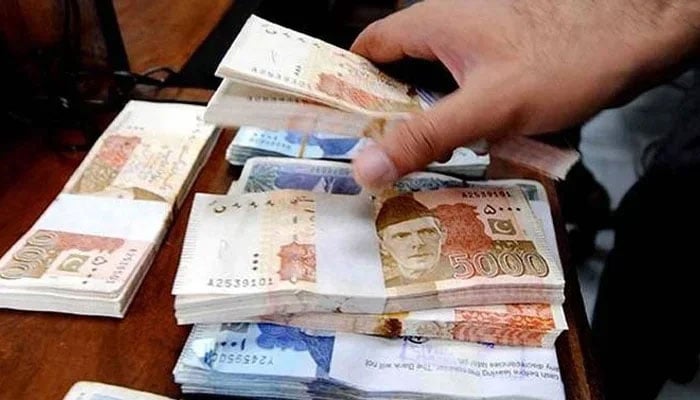SMEs get meagre 7.3pc of bank loans extended to private sector
KARACHI: Bank loans outstanding to small and medium enterprises (SMEs) totalled Rs548.19 billion at the end of May 2024, representing 7.34 per cent of the total amount of finance (Rs7.472 trillion) provided to private businesses during the same period.
This indicates that bank credit is heavily skewed towards large corporations, leaving small businesses underserved.
The State Bank of Pakistan’s latest statistics showed that as of May 31, 2024, bank advances to SMEs increased by 5.63 per cent on a year-on-year (YoY) basis. As of May 2023, the total outstanding loans to small and medium-sized businesses was Rs518.96 billion. By the end of April this year, the total amount of these loans was Rs548.575 billion.
The data showed that short-term or working capital loans amounted to Rs4.342 trillion of all outstanding bank loans to the private sector. Nonetheless, there were Rs2.919 trillion in outstanding long-term or fixed investment loans to private companies.
Due to high borrowing costs; import restrictions on raw materials, equipment, and machinery; unclear policy due to political unpredictability; and the rationalization of subsidised long-term financing facilities; the demand for bank credit from private borrowers -- that is, businesses and consumers -- has remained weak since the previous fiscal year.
Aside from exorbitant interest rates, SME funding is beset with other obstacles; the diminishing ability of SMEs to repay debt and their unreliable cash flow are two major issues.
The SBP’s push and pull tactics have led to an increase in SME financing, whenever it is attained by certain banks. But this kind of enthusiasm only lasts for a few months or a year. Lending to SMEs is stopped by risk management prudence as the default rate rises. The new-to-bank rate stays stagnant as the banks deal with their current clientele.
The SBP set up re-financing facilities for modernizing SMEs and storing agricultural commodities. With the specific goal of helping companies that are unable to provide security or collateral to obtain bank financing, the SBP launched an initiative in 2021 to enhance SMEs’ access to financing. The project is called ‘SME Asaan Finance’, or SAAF, to highlight the SME facilitation aspect of this plan, which enables SMEs to receive clean loans -- that is, loans devoid of collateral.
The SME sector is crucial to Pakistan’s economy, with official figures estimating that it generates 25 per cent of export revenue and 40 per cent of the country’s GDP.
SMEs still face trouble obtaining official bank funding. This is caused by several factors, such as comparatively larger loan losses, expensive bank financing models, inadequate use of the right technologies required for financing SMEs, and inadequate security. As a result, SMEs frequently resort to extremely costly informal lending and experience growth barriers.
-
 World Economic Forum CEO Borge Brende Steps Down Following Jeffrey Epstein Ties Controversy
World Economic Forum CEO Borge Brende Steps Down Following Jeffrey Epstein Ties Controversy -
 Prince Harry's Ex Chelsy Davy Makes Special Announcement
Prince Harry's Ex Chelsy Davy Makes Special Announcement -
 Dominic Evans Speaks Out After Being Accused Of Being Involved In Nancy Guthrie Kidnapping
Dominic Evans Speaks Out After Being Accused Of Being Involved In Nancy Guthrie Kidnapping -
 AI Doomsday By 2028? New Study Warns Of Global Social, Economic Disruption & ‘ Intelligence Crisis’
AI Doomsday By 2028? New Study Warns Of Global Social, Economic Disruption & ‘ Intelligence Crisis’ -
 Do Sophie And Benedict Bridgerton Get Married As Netflix Show Returns For Season 4 Part 2?
Do Sophie And Benedict Bridgerton Get Married As Netflix Show Returns For Season 4 Part 2? -
 Prince William Reveals He's 'a Little Biased' Toward One Hollywood Star
Prince William Reveals He's 'a Little Biased' Toward One Hollywood Star -
 Meghan Markle, Prince Harry Visit Special Charity On Final Day Of Jordan Trip
Meghan Markle, Prince Harry Visit Special Charity On Final Day Of Jordan Trip -
 Natalie Dormer's Reaction To Sarah Ferguson's Epstein Links Resurfaces After 'The Lady' Release
Natalie Dormer's Reaction To Sarah Ferguson's Epstein Links Resurfaces After 'The Lady' Release -
 Did You Know Famous Windows 10 Background Was Shot In Real Life? Here's Story
Did You Know Famous Windows 10 Background Was Shot In Real Life? Here's Story -
 Pete Davidson's Baby Mommy Elsie Hewitt Reveals Why She 'hated' Being Pregnant
Pete Davidson's Baby Mommy Elsie Hewitt Reveals Why She 'hated' Being Pregnant -
 Harry, Meghan Show Royal Family How To Make Impact Without Public Money
Harry, Meghan Show Royal Family How To Make Impact Without Public Money -
 Hillary Clinton Set For Deposition Before House Committee Today In Jeffrey Epstein Investigation Case
Hillary Clinton Set For Deposition Before House Committee Today In Jeffrey Epstein Investigation Case -
 Samsung Galaxy S26 Ultra Debutes With Display That Blocks Side Viewers
Samsung Galaxy S26 Ultra Debutes With Display That Blocks Side Viewers -
 Fans In Shock As 'Smiling Friends' Creators End Cult-favourite Sitcom On Adult Swim: 'They Did It On Purpose'
Fans In Shock As 'Smiling Friends' Creators End Cult-favourite Sitcom On Adult Swim: 'They Did It On Purpose' -
 Meghan Markle Accused Of Mimicking Kate’s Iconic Style On 'pseudo Royal Tour'
Meghan Markle Accused Of Mimicking Kate’s Iconic Style On 'pseudo Royal Tour' -
 Social Media Addiction ‘like Smoking’: Mumsnet Calls For Under-16s Ban With Cigarette-style Warnings
Social Media Addiction ‘like Smoking’: Mumsnet Calls For Under-16s Ban With Cigarette-style Warnings




